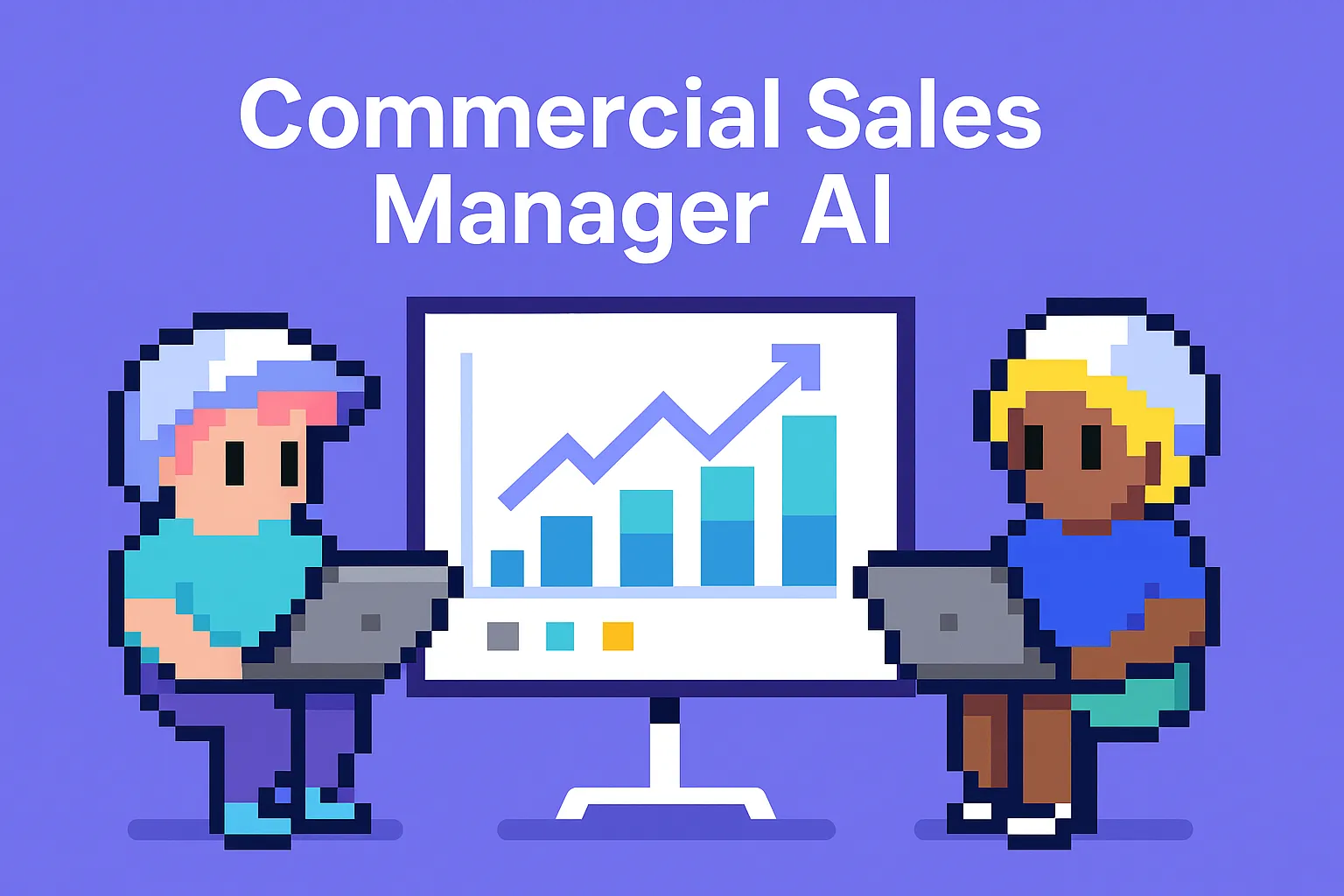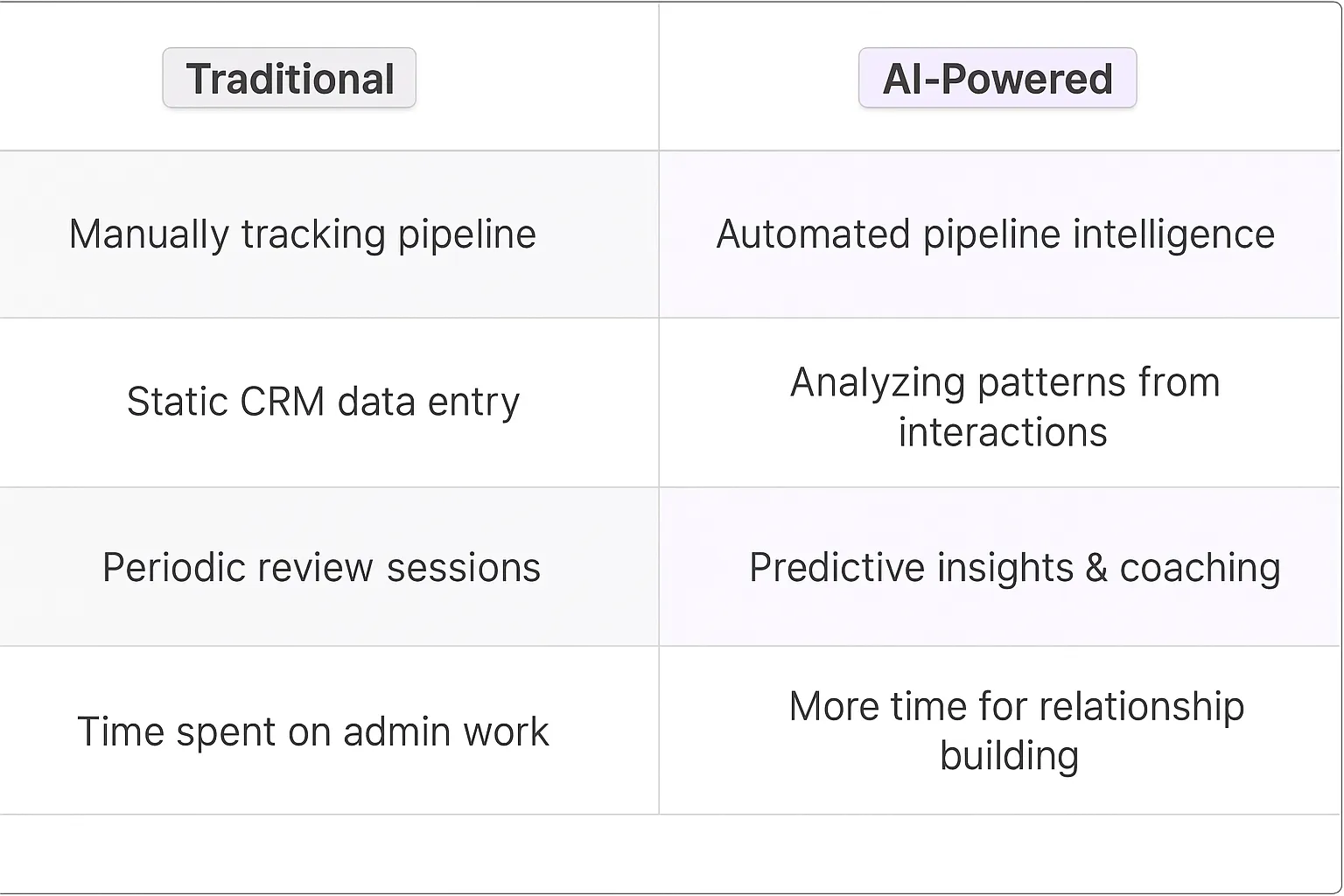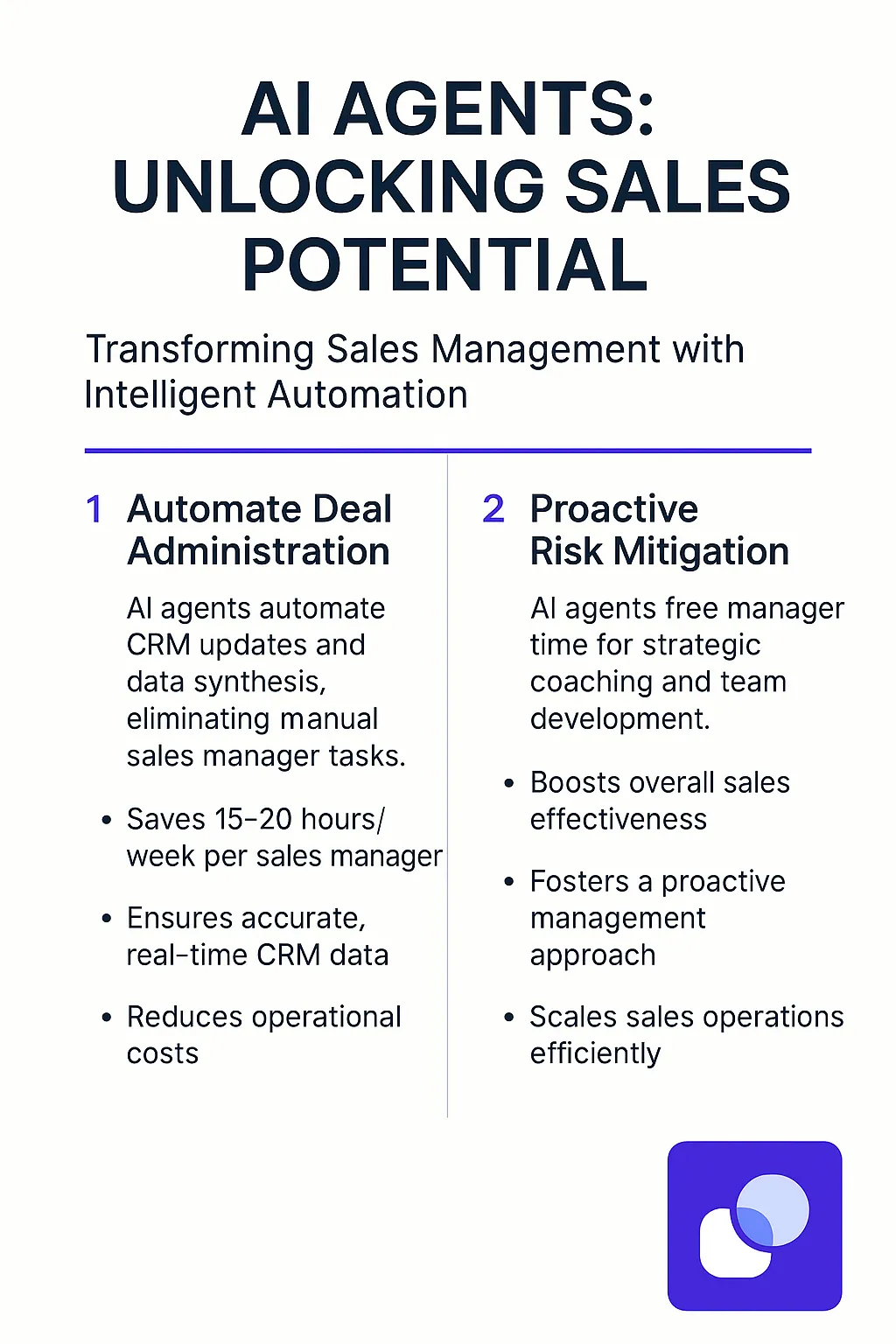Commercial Sales Manager represents a sophisticated AI-powered system designed to optimize and enhance the sales management process. It operates as a digital teammate that works alongside human sales managers, processing vast amounts of sales data, customer interactions, and market signals to drive better outcomes. The system combines advanced pattern recognition with deep learning capabilities to transform how sales teams operate and make decisions.

Commercial sales managers traditionally relied on a complex web of disconnected tools - CRM data entry, manual pipeline tracking, endless email threads, and static sales playbooks. They'd spend hours jumping between spreadsheets, updating forecasts, and trying to extract insights from scattered customer interactions. The real pain point? About 65% of their time went into non-selling activities rather than building meaningful customer relationships.
The shift to AI-powered digital teammates creates a fascinating network effect in sales operations. These agents function as a force multiplier - they're continuously learning from every customer interaction, deal progression, and sales outcome across the organization.
Looking at the data from early adopters, we're seeing three major benefits emerge:
The most interesting aspect is how these benefits compound over time. As digital teammates process more sales interactions, their pattern recognition capabilities become increasingly sophisticated. They start identifying subtle signals that even experienced sales managers might miss - like specific language patterns in customer communications that correlate with deal success.
The network effects really kick in when you consider how these insights flow across the entire sales organization. A winning approach discovered in one territory can be instantly applied across all regions, creating a continuous improvement loop that wasn't possible with traditional sales management approaches.

Commercial sales is entering a new era where AI agents function as force multipliers for sales teams. The most interesting pattern I'm seeing is how these digital teammates create compounding advantages in the sales process.
When sales managers deploy AI agents effectively, they're not just saving time - they're building a proprietary database of winning patterns. Every interaction, every closed deal, every lost opportunity feeds back into the system, making the AI more sophisticated in its approach.
The real breakthrough comes from the AI's ability to operate in the background, continuously processing and learning from data while sales managers focus on high-value human interactions. This creates a flywheel effect: better data leads to better insights, which leads to more closed deals, which generates even more valuable data.
What's particularly fascinating is how this shifts the role of sales managers from pure execution to strategy and relationship building. The AI handles the heavy lifting of data analysis and routine tasks, while managers can focus on the moments that truly move deals forward.
Start small with specific, high-impact use cases. Focus first on areas where the AI can provide immediate value through data analysis and automation of repetitive tasks. As the system learns and adapts, gradually expand its responsibilities to more complex scenarios.
The key success factor is treating AI agents as team members who need proper onboarding and training. Feed them quality data, refine their outputs, and continuously adjust their parameters based on real-world results. The most successful implementations I've seen treat this as a partnership rather than a tool deployment.

The commercial sales landscape has fundamentally shifted with AI agents becoming integral team members in sales organizations. These digital teammates create measurable impact across multiple sectors, each with their own unique sales motion and customer engagement patterns. Drawing from my experience analyzing hundreds of B2B sales teams, I've observed how AI agents transform traditional sales processes into data-driven, personalized customer journeys.
What's particularly fascinating is how AI agents adapt to different commercial sales environments - from complex enterprise software deals to industrial equipment transactions. They don't just handle routine tasks; they actively participate in deal strategy, customer research, and sales intelligence gathering. The real power lies in their ability to learn from each interaction, becoming more effective at supporting sales teams over time.
Let's dive into specific examples across industries where AI agents are creating significant value in commercial sales operations. These cases demonstrate how AI teammates integrate into existing sales processes while opening up new possibilities for revenue generation and customer relationship management.
The manufacturing equipment industry presents a fascinating case study for Commercial Sales Manager AI agents. I've spent time analyzing how these digital teammates handle the complex, multi-stakeholder dance of selling industrial machinery - and the results are compelling.
Take a mid-sized manufacturing equipment company selling CNC machines across North America. Their sales cycles typically run 6-18 months, involving technical specs, customization requirements, and multiple decision makers. The AI sales manager operates as a strategic overlay, processing vast amounts of historical deal data to identify winning patterns.
What's particularly interesting is how the AI analyzes the correlation between deal velocity and specific customer interactions. For example, it discovered that deals closed 40% faster when technical demonstrations occurred within the first three touchpoints rather than later in the cycle. The AI now automatically flags opportunities where early tech demos should be prioritized.
The system also identified that deals involving the plant operations manager early had a 3x higher close rate compared to those that started with procurement. This insight led to a complete restructuring of the initial outreach sequence.
But the real game-changer is the AI's ability to spot subtle signals in customer communication. By analyzing email sentiment and response patterns across thousands of interactions, it predicts with 85% accuracy which deals are likely to stall - often weeks before human sales managers would notice the warning signs.
The results speak for themselves: The manufacturing equipment company saw a 28% increase in deal closure rates and reduced their average sales cycle by 45 days. More importantly, they're building a continuously learning sales playbook that gets smarter with every interaction.
This isn't just about automation - it's about augmenting human sales leaders with pattern recognition at a scale no individual could achieve. The manufacturing equipment vertical proves that AI sales managers can master even the most complex B2B sales environments.
I've been tracking an enterprise software company that's redefining B2B sales with AI sales management, and the depth of transformation is remarkable. Their commercial sales manager AI analyzes patterns across their $50M+ deals, each involving 12-18 month sales cycles and multiple enterprise stakeholders.
The AI's pattern recognition capabilities shine when dealing with the complexity of enterprise software sales. By processing data from thousands of closed deals, it identified that successful enterprise sales teams spend 60% more time with technical architects in the first quarter of engagement compared to lost opportunities. This insight led to a fundamental shift in how they structure their technical discovery sessions.
What's fascinating is the AI's ability to decode the enterprise buying committee dynamics. It discovered that deals with active CIO participation in the first 60 days had a 2.5x higher likelihood of closing. Even more interesting, when the AI detected security compliance discussions before pricing conversations, deal values increased by an average of 35%.
The system's most valuable contribution comes from its real-time deal coaching. By analyzing meeting transcripts, email threads, and proposal versions, it identifies when deals are drifting from successful patterns. For instance, it flags when proof-of-concept discussions lack specific success metrics - a factor it correlates with a 70% drop in close rates.
One particularly clever feature is the AI's ability to spot "ghost objections" - concerns that stakeholders hint at but never directly express. By analyzing linguistic patterns across thousands of lost deals, it built a database of subtle signals that indicate underlying resistance to adoption.
The numbers tell a compelling story: The enterprise software company reduced their sales cycle by 90 days and increased their average deal size by 42%. But the real win is in the quality of their deals - customer churn on AI-guided sales is 40% lower than their historical average.
This case demonstrates how AI sales managers excel in complex, high-stakes enterprise sales environments where pattern recognition at scale becomes a crucial competitive advantage.
Implementing a Commercial Sales Manager AI agent requires careful navigation of several technical complexities. The agent needs deep integration with your CRM, sales tools, and communication platforms - each with their own API limitations and data structures. Many organizations struggle with data silos and legacy systems that weren't built for AI integration. The agent must also handle real-time updates and maintain consistency across multiple databases while managing sensitive customer information.
The effectiveness of your sales AI agent depends heavily on the quality and quantity of historical sales data. Many companies discover their sales data is inconsistent, incomplete, or trapped in formats that aren't machine-readable. Training the agent requires extensive clean data spanning different sales scenarios, customer interactions, and successful deal closures. Without proper data preparation, the agent may perpetuate existing biases or make incorrect assumptions about sales strategies.
Sales teams often show resistance to AI tools, fearing job displacement or loss of personal relationships with clients. The key challenge lies in demonstrating how the agent amplifies rather than replaces human capabilities. Sales managers need to invest time in training their teams to work alongside AI, showing them how to leverage the agent's capabilities for better customer insights and more efficient deal management.
Sales AI agents raise important ethical questions about transparency and customer trust. Should customers know they're interacting with an AI? How do we ensure the agent doesn't cross ethical boundaries in pursuit of sales targets? Organizations need clear policies on AI disclosure, data usage, and decision-making boundaries. The agent must balance aggressive sales targets with maintaining authentic customer relationships and brand reputation.
Determining the true impact of a Commercial Sales Manager AI agent isn't straightforward. While basic metrics like revenue increase and deal velocity are easy to track, measuring the quality of customer relationships and long-term business impact requires more sophisticated evaluation frameworks. Organizations need to develop new KPIs that capture both quantitative and qualitative aspects of AI-enhanced sales performance.
As your sales operation grows, the AI agent needs to scale accordingly. This means handling increased data volumes, adapting to new markets, and maintaining performance under higher loads. Regular updates, monitoring, and refinement of the agent's capabilities require dedicated technical resources and ongoing investment. The challenge lies in building a sustainable infrastructure that can grow with your business while maintaining consistent performance.
The integration of AI agents into commercial sales management marks a fundamental shift in how sales teams operate. The technology's ability to process vast amounts of data, identify patterns, and provide real-time insights creates a compound effect that traditional sales approaches can't match. What makes this particularly powerful is the continuous learning loop - each interaction makes the system smarter, more nuanced, and more valuable to the organization. Sales teams that embrace these digital teammates aren't just automating tasks; they're building a proprietary advantage that grows stronger over time. The future of sales management lies in this symbiotic relationship between human expertise and AI capabilities.